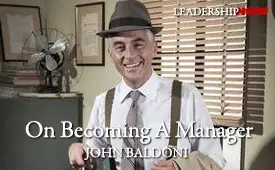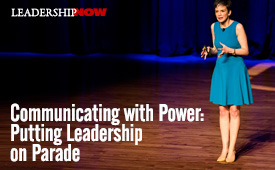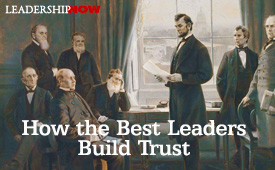
Leaders Serve and Sacrifice | Reading Room BY JAMES M. KOUZES AND BARRY Z. POSNER |
Are you on this planet to do something, or are you here just for something to do? If you’re on this planet to do something, then what is it? What difference will you make? What will be your legacy?
We pose these questions to first-year students in our leadership classes at Santa Clara University. It’s pretty heady stuff for eighteen-year-olds barely three months out of high school. Most adults haven’t thought seriously enough about these questions. We don’t expect our students to have ready responses. We just believe that they ought to be thinking about what their legacies will be—not only as they begin their college careers but throughout all the days of their lives. “What will be your legacy?” does not have a single answer or a right answer. It’s not like a math problem with a formula we can offer. But asking the question opens our students to the notion that along life’s journey they’re going to be struggling with determining the difference they want to make, and with doing things that matter. They’re going to be making choices at school, at work, at home, and in the community, and every choice they make will be part of the legacy they leave, however consciously or unconsciously they behave. Asking the question about legacy brings forward another central observation: leadership is not solely about producing results. Success in leadership is not measured only in numbers. Being a leader brings with it a responsibility to do something of significance that makes families, communities, work organizations, nations, the environment, and the world better places than they are today. Not all these things can be quantified. Our own studies, as well as those of many other authors and scholars who have explored leadership and leaders, have shown that leadership often begins with pain and suffering (our own and in the conditions of others). Our colleague Patrick Lencioni, the author of several best-selling leadership books, told us that when he graduated from college he “wanted to change the world. Call it what you will, I was determined to make a difference.” However, the problem with this zeal, he went on to explain, was that he hadn’t thought deeply enough about two fundamental matters: “Who are the people I am really serving? And am I ready to suffer?” Each of us has to answer these questions of ourselves before we can change the world, make a difference, and leave a legacy. If we’re going to be authentic in our leadership, we have to be willing to serve, and we have to be willing to suffer. “Now, wait a minute,” you say. “Do you mean to tell me that I have to work hard all my life, and that when I get to be a leader what I get in return is that I have to serve others and I have to suffer in the process? That’s not what I signed up for. No one ever told me that leaders have to do that!” Only Leaders Who Serve Earn Commitment Everything leaders do is about providing service. Our late colleague John Gardner once observed, “A loyal constituency is won when the people, consciously or unconsciously, judge the leader to be capable of solving their problems and meeting their needs.” (John knew a lot about leadership, having once been Secretary of Health, Education and Welfare, founded Common Cause, and served as an adviser to six U.S. presidents, as well as being a respected author and scholar.) John didn’t mean that the leader should personally fix the problems and fulfill the needs. What he was suggesting is that people willingly follow someone who’s attuned to their aspirations, fears, and ideals. Loyalty is not something a boss can demand. It’s something people choose to grant to a person who has earned it. The people’s choice to follow is based not simply upon authority but upon the leader’s perceived capacity to meet a need. Perhaps we can better present the importance of the constituent perspective by rephrasing John’s comment. Try reading it this way: “Loyal customers are won when the customers, consciously or unconsciously, judge the company to be capable of solving their problems and meeting their needs.” Isn’t that exactly how organizations win customer loyalty? By solving problems and meeting needs? Customers decide whether to continue to give us their business, and if we want our customers’ loyalty then it’s our job to be responsive. The same is true for leaders. Constituents decide whether or not they’ll be loyal. Loyalty is earned when constituents decide that their needs are getting met, so leaders who want commitment had better see their jobs as requiring responsiveness. Believing foremost in service means being more concerned about the welfare of others than you are about your own well-being. Now, the first objection we always hear to this point of view is that customers pay us, but we pay our followers. Oh, really? That might be true if the only constituents you thought you had were your employees, and if all you were considering was the paycheck. But what about energy, drive, initiative, spirit, dedication, and all the other emotional currencies that people pay us with? And what about your peers, your suppliers, your business partners, and the like? Aren’t they also your constituents? When we talked to Betsy Sanders, who at the time was general manager for Nordstrom in California, she was quite emphatic about this point. “I serve my associates so that they can serve our customers well. Actually, I’m at the bottom of the organizational pyramid supporting them and not at the top with them supporting me.” When leaders accept that they are servants first, then they clearly know where they stand. And it’s not at the head of the line. Viewing leadership as service is not a new concept. More than three decades ago Robert Greenleaf, himself a retired corporate executive, observed that the “great leader is seen as servant first, and that simple fact is the key to [the leader’s] greatness.”2 We release tremendous power and energy when we serve. Nancy Ortberg, former teaching pastor at Willow Creek Church and now a church leadership consultant, pointed it out to us this way: Without the element of servant leadership, the furthest you will get into someone’s motivation is the “have to” level. Over time, that will build a narrow, thin organization. When a leader is able to drive down deep and get to the “I want” motivation, the organization becomes a type of perpetual motion machine. It no longer takes as much energy from you as a leader because you’ve built into those around you the zeal to do a job well. The “sustain” you’ve tapped in your team will carry all of you, collectively, well into the future. The purpose of leaders is to mobilize others to serve a purpose. And if you’re here to serve a purpose, the purpose comes first. You’ll have to make sacrifices in service of that purpose. In this age of reality shows like Survivor, The Apprentice, and The Amazing Race it might appear to some that success is winner-take-all and at all costs. Not to us, not to our students, not to Pat Lencioni, not to John Gardner, not to Robert Greenleaf, and not to Nancy Ortberg. Passionate Leaders Are Willing to Suffer When people talk about leadership, they often use the word passion. And when we think about passion we tend to think of emotions like enthusiasm, zeal, energy, exuberance, and intensity. Well, all these attributions might be true, but when you look up the word passion in any dictionary that includes origins you’ll see that it comes from the Latin word for suffering. Passion is suffering! A passionate person is someone who suffers and a compassionate person is someone who suffers with, and shares the suffering of, others—and wants to take action to alleviate this condition. Nearly every act of leadership requires suffering—and often for the leader a choice between one’s personal success and safety and the greater welfare of others. We’re asking you to understand that nothing great comes without costs. Leadership is hard work. It’s not easy despite what we, or others, may write in our attempts to make leadership more accessible. While we offer words of encouragement, tools and techniques, examples, and practical applications with the hope of improving leadership skills and confidence, we fully recognize that nothing great was ever accomplished without making sacrifices. At times we will suffer, and those we love and cherish will suffer, if only because of the trade-offs we have to make between our own personal interests and those of the greater good. If you want to be a leader, you must be willing to pay a price. By sacrificing, you demonstrate that you’re not in it for yourself. This sends the message, loud and clear, that you have the best interests of others at heart. The most significant contributions leaders make are not to today’s bottom line but to the long-term development of individuals and institutions that adapt, prosper, and grow. People should never take on the job of leadership if they’re unwilling to see beyond their own needs. If they do, they will ultimately fail. We’ll all be remembered for something. The question is, for what? What will others say about you when you’re no longer around? Each of us lives on in the memories we create, in the systems and practices we set in place (or don’t), and in the lives we touch. We guarantee that what people will say about you will not be about what you achieved for yourself but what you achieved for others. Not how big a campfire you built but how well you kept others warm, how well you illuminated the night to make them feel safe, and how beautiful you left the campsite for those who would come after you to build the next fire. Source: A Leader's Legacy, Chapter 1: Leaders Serve and Sacrifice ©2006 James M. Kouzes and Barry Z. Posner All Rights Reserved. Used by permission. |
|
 
The Persistence of Vision MICHAEL MCKINNEY 
On Becoming A Manager JOHN BALDONI 
Communicating with Power: Putting Leadership on Parade KEVIN DALEY 
How the Best Leaders Build Trust STEPHEN M. R. COVEY 
The Men Behind the Guns of Business RICHARD W. SEARS 
The Focus of Leadership MICHAEL MCKINNEY 
Why Leaders Fail MARK SANBORN |
 |
| ||
 | © 2019 LeadershipNow All materials contained in https://www.LeadershipNow.com are protected by copyright and trademark laws and may not be used for any purpose whatsoever other than private, non-commercial viewing purposes. Derivative works and other unauthorized copying or use of stills, video footage, text or graphics is expressly prohibited. |
||